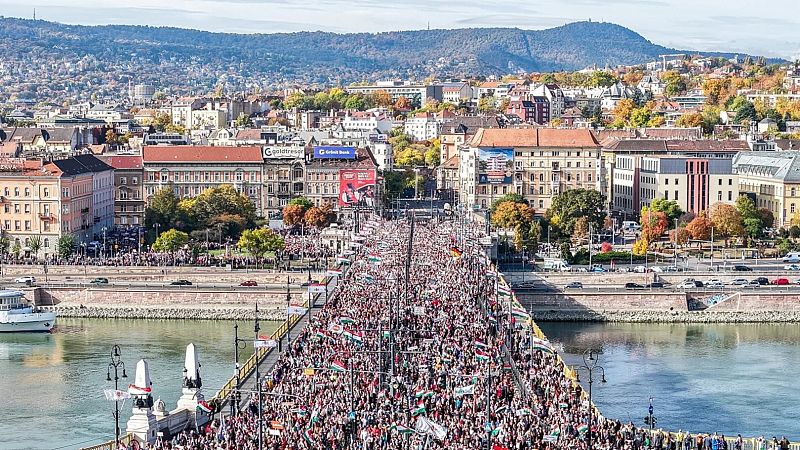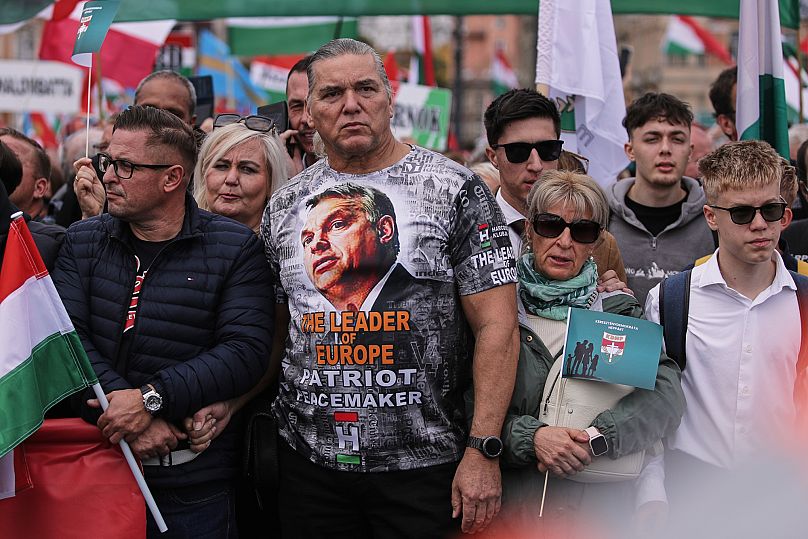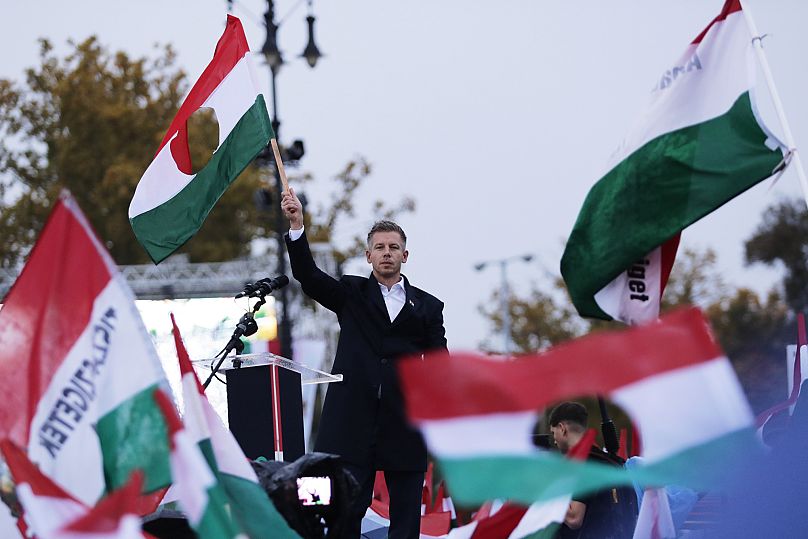Hungary's Orbán and Magyar hold competing rallies before 2026 election

Hundreds of thousands of Hungarians filled the streets of Budapest on Thursday in competing demonstrations, as supporters of the country’s two main political movements staged mutual shows of strength before next spring’s national election.
With elections due in April, the rival rallies were a standoff between conservative Prime Minister Viktor Orbán and his main political challenger, Péter Magyar, who looks set to present the long-serving Hungarian leader with the most competitive ballot in his 15 years in power.
Orbán’s supporters gathered on a bridge spanning the Danube River on Thursday morning and began marching toward Budapest's landmark neo-Gothic parliament.
Dubbed a “peace march” by organisers, the rally took place on Revolution Memorial Day, a national holiday in memory of a failed anti-Soviet uprising in 1956 that was crushed by the Red Army.
The event, however, largely focused on criticising EU policy on Ukraine as well as the country's main opposition party, Tisza.
Participants shouted slogans backing Orbán and his message that foreign powers threaten to push Hungary into direct involvement in Russia’s war in Ukraine. At the front of the march, one large banner read, “We don’t want to die for Ukraine”.
Orban again slams EU leaders as warmongers
Addressing the crowd in a speech riddled with hostility for both Ukraine and the European Union — regular subjects of his ire — Orbán accused Kyiv’s European backers of having brought the EU into the war and of being willing “to send others to die”.
Orbán has consistently argued against Western support for neighbouring Ukraine since Moscow launched its full-scale invasion in early 2022, and has maintained friendly relations with the Kremlin while criticising Kyiv.
The Hungarian leader has also vehemently opposed Ukraine’s ambitions to join the EU and has argued for an immediate ceasefire in the war. However, he has not addressed what that might imply for Ukraine’s territorial integrity or European security amid continued Russian aggression.
During his roughly 40-minute speech, Orbán said that Ukraine “has long ceased to be sovereign and independent and is absolutely not self-sufficient.”
He said he would support a strategic partnership between the EU and Kyiv, but that Ukraine “cannot be members either of our military or economic alliance. They would bring war, take our money, and ruin our economy.”
Magyar accuses Orban of impoverishing Hungary
Later in the day, throngs of supporters of opposition leader Magyar filled one of Budapest’s central squares and adjacent avenues for their own demonstration — both an anti-government protest and a show of support for Magyar and his conservative Tisza party.
The march organised by Tisza featured performances and photo exhibitions commemorating the failed anti-Soviet uprising in 1956. Marchers shouted anti-government slogans as well as “Russians go home” — a refrain from the 1956 rebellion and a modern reference to many people’s view that Orbán has drawn the country too close to Moscow.
One Tisza supporter, Zsanett Kiss, travelled from Pápa in western Hungary to attend the march. She said she believed Magyar would be able to improve Hungary’s stagnant economy and also bring the country back to a more liberal path.
“I want there to be a change already in this country, and I can say that I’ve had enough, enough of the last 15 years,” she said.
Speaking to the crowd of his supporters that filled Budapest’s sprawling Heroes’ Square, Magyar accused Orbán of impoverishing the country by misusing public funds and turning Hungarians against one another.
The 44-year-old lawyer and former insider within Orbán’s Fidesz party burst into political prominence last year.
Since then, he has focused his message on bread-and-butter issues affecting the majority of Hungarians: persistent inflation, poor health care, and increasingly salient allegations of government corruption — all sources of dissatisfaction that have plagued Orbán’s government.
The rural countryside, which has always been a dependable vote base for Orbán’s ruling Fidesz party, has been the focus of Magyar's campaign.
He recently concluded an 80-day national tour during which he spoke at numerous town hall-style meetings and fielded audience questions.
But this time around, he is adopting an inclusive stance, urging his followers to accept their political rivals after the April 2026 election. An exact date for the vote is yet to be set.
Today



